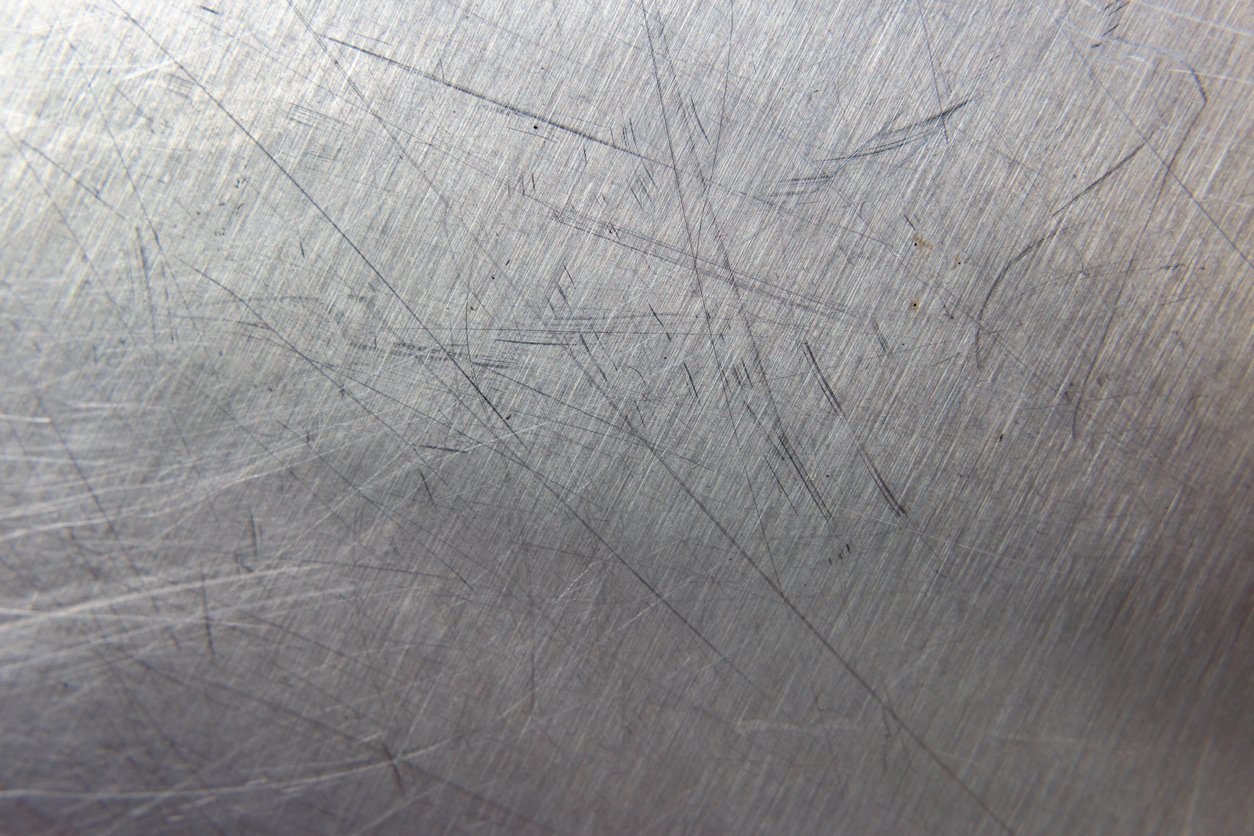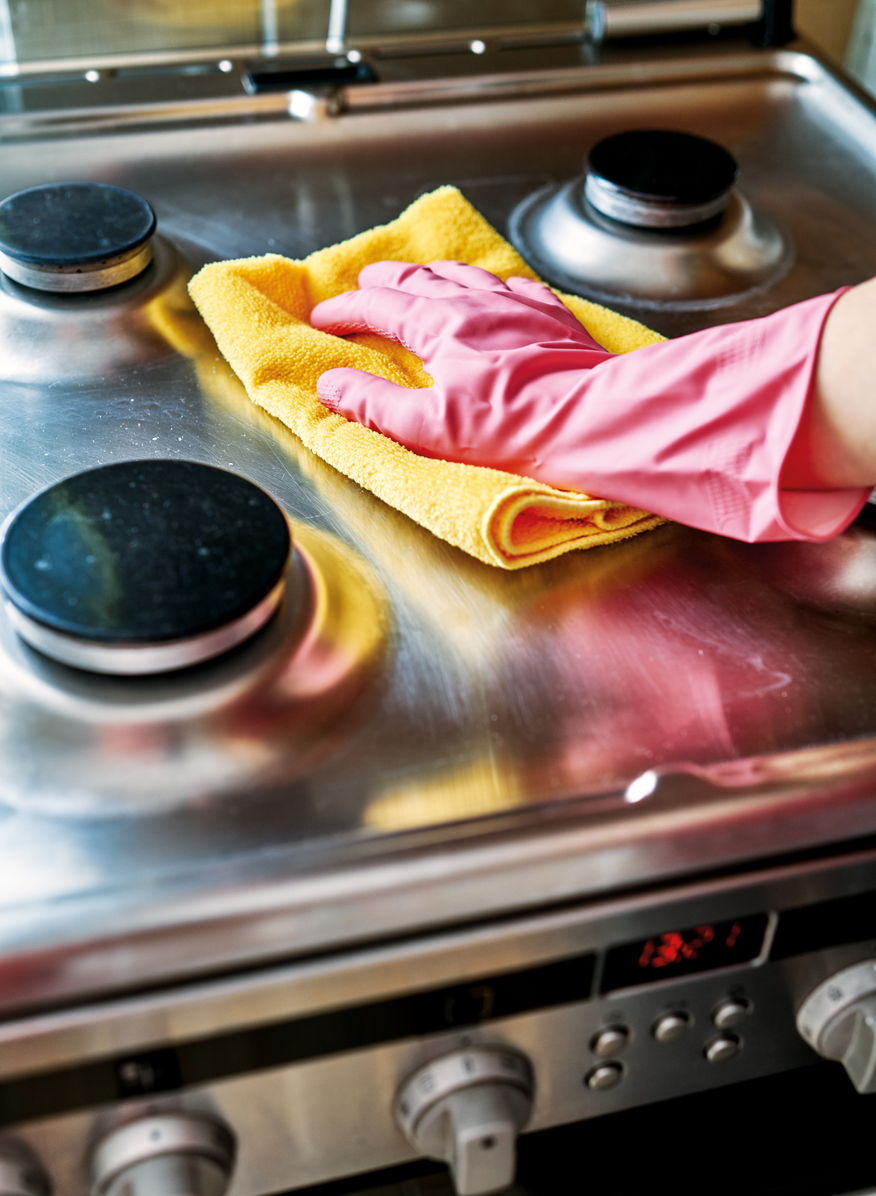

We may earn revenue from the products available on this page and participate in affiliate programs. Learn More ›
From sinks and appliances to counters and cabinet hardware, stainless steel remains popular in home kitchens, favored for its sleek look and durability. Sturdy though it may be, stainless steel appliances can unfortunately acquire unsightly scratches from everyday household use. Armed with the knowledge of how to remove scratches from stainless steel, however, it’s totally possible to minimize and even successfully remove these scratches altogether.
Follow the two sets of steps below on how to remove fine or deep scratches in stainless steel to improve the appearance of your kitchen, and refer to some helpful scratch prevention tips to keep your stainless steel clean and in peak condition for years to come.
How to Remove Fine Scratches From Stainless Steel

Look closely and you’ll see that stainless steel has brush marks on its surface. This is called the grain, a result of the stainless steel manufacturing process. Whichever scratch removal method or product you use, it’s essential to rub only in the direction of this grain. A common stainless steel maintenance mistake is going against the grain, which may create new scratches and potentially worsen existing ones.
Note: Do not use this scratch removal method on stainless steel that has a protective clear coat or synthetic surface applied, or else you may do more damage than you fix.
SUPPLIES
Stainless steel buffing compound
Microfiber cloths
Step 1: Prepare the stainless steel buffing compound.
Start with a liquid or powdered non-abrasive buffing compound you would normally use to clean stainless steel, like Bar Keeper’s Friend (in a pinch, you can even use whitening toothpaste). If your stainless steel cleaner of choice is cream-based, proceed to the next step. If you’re using a powdered stainless steel scratch remover, follow the label instructions for mixing until you have a paste roughly the consistency of toothpaste. When mixing in water, it helps to add it a few drops at a time in order to achieve the right thickness.
Step 2: Identify and buff out the fine scratch.
If possible, start by finding a smaller scratch in an inconspicuous spot on the clean and dry stainless steel surface. Apply a small amount of the cream or paste to a microfiber cloth and very gently rub it back and forth over the scratch, working in the direction of the metal’s grain. Continue until the scratch buffs out or diminishes in appearance.

Tried-and-True Advice
“When buffing out scratches, be sure to move in the direction of the stainless steel grain and don’t rub your buffing cloth in circles. I’ve used baking soda mixed with water to work out scratches, but it’s important to test whatever buffing agent you decide to use in an inconspicuous spot before buffing to ensure you don’t make scratches worse.
After buffing out scratches, I like to spray the stainless steel surface with distilled white vinegar and then wipe it with a clean cloth. I finish up by polishing the stainless steel with oil. I’ve used olive oil in the past, but you can also use stainless steel polish. To avoid scratches altogether, make a habit of gently cleaning your stainless steel to keep grime from building up and eliminate the need for heavy-duty cleaning.”
—Lauren Landers, Contributing Writer
Step 3: Wipe the metal surface clean.
Dampen a fresh microfiber cloth and use it to remove any remaining metal scratch remover residue in the spot where the scratch was, wiping in the direction of the grain. Fully dry the area with a clean, dry microfiber cloth.
Step 4: Repeat with all visible fine scratches on the surface.
If the above process for how to get scratches out of stainless steel produces satisfactory results, repeat Steps 2 and 3 on any other visible scratches in the metal. Continue to go with the stainless steel grain while buffing, and be sure to swap in new microfiber cloths as needed to avoid leaving excess buffing compound residue on the surface.
How to Remove Deep Scratches From Stainless Steel

For larger or deeper scratches on stainless steel that aren’t obviously affected by the above method, there’s still hope for a scratch-free surface. Stainless steel scratch removal kits are made for this exact type of job, generally containing a set of abrasive pads, a buffing compound, and blending agent. Unlike the process for removing fine scratches, scratch removal kits fix stainless steel scratches by working up from a coarser grit to a finer one to remove imperfections and restore the surface. Carefully follow the manufacturer’s directions included in your kit.
Note: Unless otherwise specified on the product label or appliance user manual, do not use any scratch removal kit on stainless steel with a fingerprint-resistant clear coat or other synthetic surface. Using the included abrasive pads directly on anything but stainless steel can cause further damage.
SUPPLIES
Microfiber cloths
Stainless steel scratch removal kit
Barry’s Ultra Shine
Step 1: Identify the deep scratch and make a first pass.
Open the stainless steel scratch remover kit and read the full instructions on how to buff out scratches, including any preparation steps and safety warnings. Find the coarsest abrasive pad in the kit and apply the included buffing compound as directed to clean, dry stainless steel. Using the prescribed number of strokes, rub the compound into the scratch along the grain.
Step 2: Wipe the work surface clean.
Rubbing in the direction of the grain, use a microfiber cloth to wipe off the compound as directed and take a better look at the scratch. If the scratch is no longer visible, skip to Step 4. If the scratch is still visible, proceed to Step 3.
Step 3: Continue to buff the scratch with increasingly fine pads (optional).
Switch to the next finest abrasive pad as indicated by the kit instructions, and apply more buffing compound if directed. Repeat the process of scrubbing, wiping, and evaluating the scratch, switching to finer pads as necessary and going with the grain throughout. Even if the scratch remains after using all of the kit’s included abrasive pads, don’t worry: The final touchup pass might still produce a noticeable improvement.

Step 4: Blend the scratch into the surrounding area.
Depending on your chosen scratch removal kit, it may include an extra chemical and soft pad in addition to the buffing compound and abrasive pads. If your kit doesn’t include this, however, you can purchase Barry’s Ultra Shine or a similar product separately and apply it with a clean, dry microfiber cloth.
Apply the finishing agent to the provided pad or cloth and rub it onto and around the scratch as directed, polishing with the grain of the metal. Stop and check the progress of the blending frequently. Decrease the amount of applied pressure gradually you go until the work area is sufficiently blended with the rest of the stainless steel surface.

How to Prevent Scratches in Stainless Steel
With that scratch on your stainless steel fridge or other kitchen surface removed, now is a good time to brush up on how to keep your metal surfaces looking pristine. Follow these tips to prevent scratches on your stainless steel from accumulating in the first place:
- Do not use abrasive cleaners, steel wool, or other rough materials when cleaning and polishing stainless steel. (For cleaners we recommend, read about our tests of the best stainless steel cleaners, or make your own homemade stainless steel cleaner.)
- Avoid stainless steel sink scratches by laying down a rubber dish mat at the bottom of the basin when washing metal pots and pans, especially ones made of cast iron.
- Cut meat, fruit, and vegetables on a cutting board to avoid stainless steel countertop scratches.
